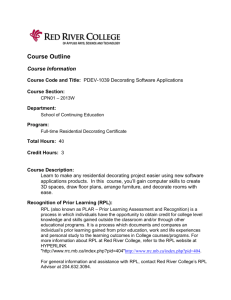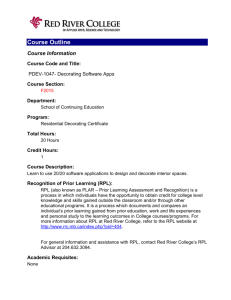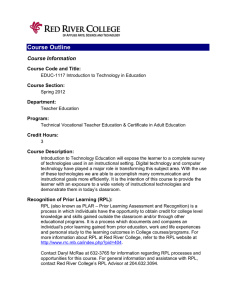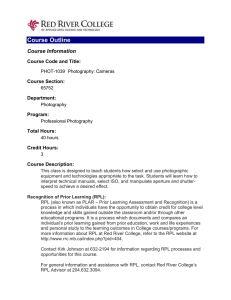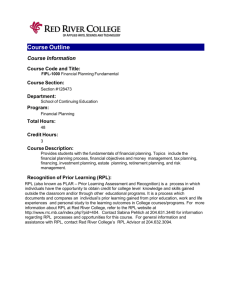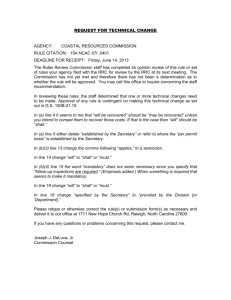Course Outline - Educational Psychology
advertisement
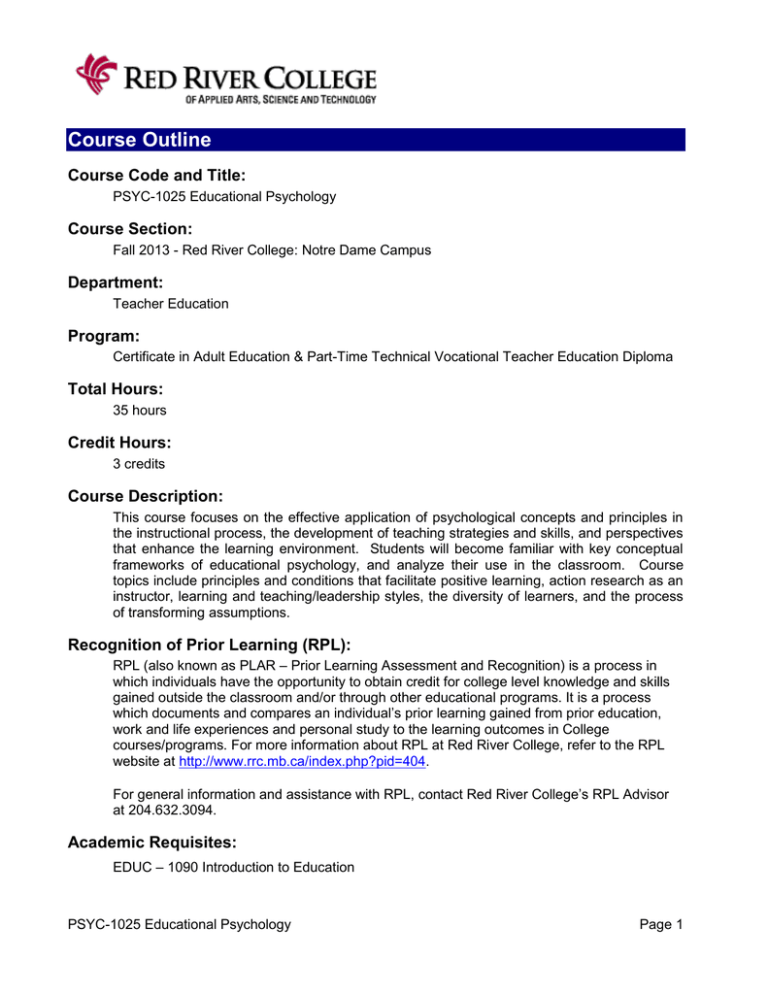
Course Outline Course Code and Title: PSYC-1025 Educational Psychology Course Section: Fall 2013 - Red River College: Notre Dame Campus Department: Teacher Education Program: Certificate in Adult Education & Part-Time Technical Vocational Teacher Education Diploma Total Hours: 35 hours Credit Hours: 3 credits Course Description: This course focuses on the effective application of psychological concepts and principles in the instructional process, the development of teaching strategies and skills, and perspectives that enhance the learning environment. Students will become familiar with key conceptual frameworks of educational psychology, and analyze their use in the classroom. Course topics include principles and conditions that facilitate positive learning, action research as an instructor, learning and teaching/leadership styles, the diversity of learners, and the process of transforming assumptions. Recognition of Prior Learning (RPL): RPL (also known as PLAR – Prior Learning Assessment and Recognition) is a process in which individuals have the opportunity to obtain credit for college level knowledge and skills gained outside the classroom and/or through other educational programs. It is a process which documents and compares an individual’s prior learning gained from prior education, work and life experiences and personal study to the learning outcomes in College courses/programs. For more information about RPL at Red River College, refer to the RPL website at http://www.rrc.mb.ca/index.php?pid=404. For general information and assistance with RPL, contact Red River College’s RPL Advisor at 204.632.3094. Academic Requisites: EDUC – 1090 Introduction to Education PSYC-1025 Educational Psychology Page 1 Course Format & Delivery: The course is presented in an E-tv setting. In this format some students are physically in a classroom with the teacher and some are connected via a broadband connection. Each student brings with them a variety of knowledge and experiences that will benefit the class. Students’ willingness to sharing this knowledge and experience as occasions arise will contribute greatly to the overall success of the learning environment. The course will be highly interactive and participatory. There will be brief lectures as well as small group discussions. Communication Tools: The following communication tools will be used in this course: The timetable, email, course website - http://educationalpsychologyrrc.weebly.com, scheduled meetings as required Effective Date: September, 2013 Instructor Information Instructor’s name: Michael Link Email: mikewilliamlink@yahoo.ca Office hours: by appointment Student Readiness Technology & Equipment Readiness: Computer, Internet Student Commitments and Contact Times: 3 hours/week of formal class meetings over an 8 week period Students should be prepared to dedicate an additional 2-3 hours/week outside of scheduled class time to complete assignments and prepare for class discussions (exact times will vary from student to student) Both online and face-to-face students are expected to attend our sessions regularly, to be punctual, to be prepared and willing to participate actively in class and to act in a professional and respectful manner towards peers and instructor. In the event of extenuating circumstances that will prevent you from attending class, I will expect you to contact me by email prior to class. As a sign of respect to everyone in class, please turn off all cell phones (and any other hand-held devices) before entering class unless there are extenuating reasons not to do so and you have discussed those reasons with me. All assignments should be handed in on time and complete, again, unless there are extenuating reasons not to do so and you have discussed those reasons with me. If you are connecting remotely and have any issues with submitting assignments, you may email your assignment to your instructor until you have contacted the instructor and the issue has been resolved. Course Resources: Textbook(s): Weekly readings and resource materials are available on our course website: http://educationalpsychologyrrc.weebly.com/index.html PSYC-1025 Educational Psychology Page 2 The course blog can be found at: http://edpsych2013rrc.blogspot.ca Other *If you are a student with a disability and require reasonable accommodations, you are encouraged to discuss this privately with your instructor to facilitate greater understanding of your learning needs. To receive accommodations, you also must connect with Counselling and Accessibility Services who will assist in developing and implementing your accommodation plan. You can contact Counselling and Accessibility Services in person at NDC (D102) or EDC (P210) or by filling out the online intake form which can be found on our website at http://www.rrc.mb.ca/index.php?pid=706. For further information about RRC’s accommodation process, see the Handbook for Students with Disabilities at: http://www.rrc.mb.ca/files/file/disabilities/handbook.pdf Student Learning Learning Outcomes By the end of this course of study, you should be able to . . . 1. 2. 3. 4. 5. 6. Apply key terms related to educational psychology. Critically reflect on assumptions about diverse learners. Describe the effect of assumptions on teaching and learning. Identify and discuss principles that support the notion of effective education. Situate action research within a conceptual framework. Demonstrate an increased sensitivity to the diversity of learners Instructional Topics Topics Orientation to Psychology Reflection on Educational Psychology Abilities and Disabilities Culture and Community Complex Cognitive Processes Motivation in Learning and Teaching Theory Building Through Action Research Assignment and Evaluation Details provided in the course assignment package provided by the instructor Note: Topics listed provide a course guide only. Time constraints and specific needs of the group might require that some of the above topics be omitted or covered in less detail or that additional topics be addressed. PSYC-1025 Educational Psychology Page 3 Letter Grade Distribution A+ 4.5 90 to 100% C+ 2.5 65 to 69% A 4.0 80 to 89% C 2.0 60 to 64% B+ 3.5 75 to 79% D 1.0 50 to 59% B 3.0 70 to 74% F 0.0 0 to 49% Minimum performance requirement for this course: “C” (60 – 64%) All assignments must be completed satisfactorily to attain a final mark in this course. Course Policies: General Academic Policies: It is the student's responsibility to be familiar with and adhere to the Red River College (RRC) Academic Policies. These Policies can be found in the RRC calendar or online under “A SERIES – ACADEMIC MATTERS at http://www.rrc.mb.ca/index.php?pid=4523. Additional Policies and Procedures: Student Code of Rights and Responsibilities http://www.rrc.ca/files/File/policies/new/S1%20Student%20Code.pdf Academic Integrity http://www.rrc.mb.ca/files/File/policies/new/S4%20Academic%20Integrity.pdf Discrimination and Harassment http://www.rrc.mb.ca/files/file/policies/new/H1DiscriminationandHarassment.pdf Date Revised: September, 2013 Authorization: This course is authorized for use by: _________ ________________ Chair, Teacher Education ____August 9, 2013____ Date ©Red River College 2012 PSYC-1025 Educational Psychology Page 4
